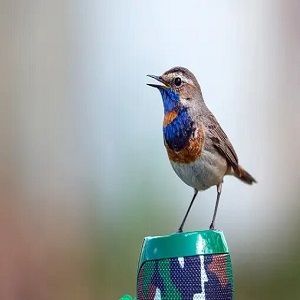Are Birds So Loud In The Morning? Birds are particularly loud in the morning due to a combination of environmental and biological factors. In the early hours, the air is usually cooler, denser, and less turbulent, creating better acoustic conditions for sound transmission. This allows bird calls to travel farther and be heard more clearly by potential mates or rivals.
Biologically, morning is an optimal time for birds to communicate vocally. They use their calls to establish territory boundaries, attract mates, and warn of potential dangers. As the day progresses, other ambient noises increase, potentially drowning out their calls, making the quieter morning hours more suitable for effective communication. Additionally, morning sunlight triggers hormonal changes that stimulate birds’ vocalizations, contributing to their heightened activity during this time.
Why Are Birds Louder in the Morning?
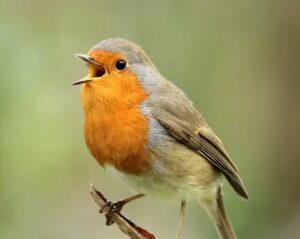
- In the early morning, the air is often cooler, denser, and less turbulent. These conditions enhance sound transmission, allowing bird calls to travel farther and remain clear. This is crucial for birds to communicate effectively over long distances, such as establishing territories and attracting mates.
- As the day progresses, the environment becomes noisier with human activities, traffic, and other ambient sounds. The morning hours provide a window of relative quiet before these noises become overwhelming. Birds take advantage of this period to make their calls more audible and to ensure their messages are not lost among competing sounds.
- Many bird species are more active during the early morning as they forage for food, defend territories, or engage in courtship rituals. Hormonal changes triggered by the morning light stimulate birds’ vocalization centers, leading to increased vocal activity. By communicating more intensely in the morning, birds can establish their presence, defend their resources, and attract potential mates or warn of predators effectively.
May You Like This: 20 Amazing Types Of Florida Beach Birds (With Pictures)
How Do Birds Chirp?
Birds chirp using the larynx, a specialized vocal organ located at the base of the windpipe where it divides into the bronchi. The syrinx contains muscles, membranes, and cartilage that enable birds to make sounds. As air from the bird’s lungs moves through the larynx, muscles regulate the tension and position of the syringe’s components, creating vibration. These vibrations produce specific tones and noises that the bird controls by changing muscle tension and airflow. By manipulating the complex structure of the syrinx, birds can produce a variety of complex and melodic sounds that serve diverse purposes, such as communication, mating, territorial defense, and the establishment of social hierarchies.
Why Are Birds So Loud In The Morning: Exploring the Reasons Behind Their Chirping
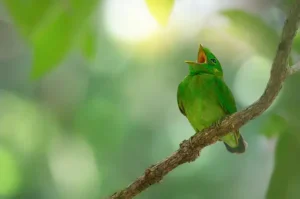
Due to a combination of favorable environmental conditions and biological factors, birds are particularly noisy in the morning. The cooler, denser morning air improves sound transmission, allowing your conversations to travel farther and be heard clearly. This is crucial for activities like recruiting a mate and establishing a territory.
Additionally, the relative lack of competing early morning noises ensures their messages don’t get lost. From a biological point of view, the hormonal changes caused by the morning light stimulate the bird’s vocalizations, resulting in increased activity. Consequently, morning bird song serves as an effective means of communication for important tasks such as conquering territory, finding mates, and warning of potential threats.
Reason #1: Attract Mates
Birds are loud in the morning to attract mates. Their early vocal activity signals strength, vitality, and a suitable territory, making them more appealing to potential partners. The clear morning air enhances the reach of these calls, ensuring they are noticed by potential mates over longer distances.
Reason #2: Mark Territory
Birds use their morning chirping to mark territory. By vocalizing loudly, they establish their presence and ownership of a specific area. The cooler morning air carries their calls further, broadcasting their territorial boundaries to other birds. This helps prevent conflicts and reduces direct confrontations, as neighboring birds can identify and respect these demarcations, ultimately minimizing the need for physical confrontation. This territorial communication aids in maintaining social order and ensuring efficient resource allocation within their habitat.
Reason #3: Peace and Quiet
Birds contribute to peace and quiet in the morning by engaging in vocal activity that establishes territorial boundaries and communicates with mates. This reduces the need for physical confrontations, creating a harmonious environment where conflicts are minimized. The relative absence of competing sounds during this time also adds to the sense of tranquility, allowing for moments of calm and serenity in nature.
Reason #4: They are Hungry
Birds’ morning chirping can indicate hunger. As the day begins, many birds actively search for food to sustain themselves. By vocalizing, they communicate their need for sustenance to potential prey, insects, or even other birds. The morning chorus serves as a form of acoustic advertising, attracting insects and small animals while alerting fellow birds to prime foraging opportunities. This synchronized effort maximizes their chances of finding food efficiently, especially when resources are most abundant in the early hours.
Reason #5: Secure Food Supply
By vocalizing, they communicate with potential prey or competitors, indirectly aiding their foraging efforts. The sound of their calls can disturb insects and other small creatures, making them more accessible for feeding. Additionally, birds might alert each other to the presence of food sources, sharing valuable information within the group. This cooperative communication enhances their collective ability to locate and exploit available food resources, ensuring a reliable supply of sustenance for the entire bird community.
Reason #6: Family Protection
Birds’ morning chirping contributes to family protection. Parent birds often vocalize to communicate with their offspring, guiding them to safe areas or warning them of potential dangers. These calls also serve to deter predators by signaling the presence of an alert and potentially aggressive parent nearby. The morning chorus can act as a collective alarm system, with multiple bird species participating. This creates a safer environment for nesting and fledgling birds, as the combined vigilance and vocalization of different species increase the chances of detecting and deterring threats. Overall, the morning chirping helps ensure the survival and well-being of bird families through enhanced communication and coordinated defensive efforts.
Reason #7: Sign of Good Health
Birds’ energetic morning chirping can be a sign of good health. The ability to produce strong, clear calls indicates vitality and fitness. Healthy birds are more capable of sustaining vigorous vocalizations, which can attract mates and establish dominance. Additionally, a robust immune system and proper nutrition contribute to vocal strength. Active morning vocalizations may also reflect optimal environmental conditions and successful foraging the previous day. Birds in good health are more likely to participate in the morning chorus, showcasing their well-being and increasing their chances of reproductive success and overall survival.
Must See That: 8 Outstanding Points About The Diet Of Baby Pigeons
Types of Birds That Chirp in the Morning
Numerous bird species participate in the morning chorus by chirping and vocalizing. Some common types of birds known for their early morning calls include:
-
- Robins: Robins are iconic songbirds known for their cheerful red breast and melodious early morning songs. They contribute to the dawn chorus, marking their presence and seeking mates through their distinctive and tuneful calls.
- Sparrows: Sparrows are small, sociable birds found in diverse habitats. Their morning chirps create a lively soundscape, communicating with each other and marking territory. Their varied calls add a charming complexity to the dawn chorus.
- Blackbirds: Blackbirds, with glossy black feathers and bright yellow beaks, produce rich and flute-like songs in the early morning. Their mellifluous calls contribute to the dawn chorus, adding depth and resonance to the avian symphony.
- Warblers: Warblers, small and vibrant, join the morning chorus with intricate and diverse songs. Their melodious calls fill the air, creating a tapestry of sound as they communicate and seek mates in the early hours.
- Thrushes: Thrushes, such as the American Robin, greet the morning with beautiful, melodious songs. Their clear and uplifting calls resonate through the dawn chorus, marking their presence and contributing to the natural symphony of the early hours.
- Cardinals: Cardinals, with vivid red plumage, sing clear and whistling songs that pierce the morning silence. Their distinctive calls add a vibrant and recognizable element to the dawn chorus, enhancing the auditory landscape.
- Mockingbirds: Mockingbirds, skilled mimics, enrich the morning soundscape with a medley of imitated calls. Their versatile songs, blending various sounds, create a unique and captivating contribution to the dawn chorus, showcasing their impressive vocal abilities.
- Finches: Finches, like the House Finch, add cheerful notes to the morning chorus with their varied calls and songs. Their tuneful melodies and vibrant sounds contribute to the lively avian symphony of the early hours.
- Wrens: Wrens, lively and energetic, lend their captivating trills and rapid songs to the morning serenade. Their charming vocalizations create a delightful and distinctive element in the dawn chorus, filling the air with their lively tunes.
- Canaries: Canaries, renowned for their melodious tunes, join the morning chorus with clear and vibrant songs. Their tuneful notes contribute to the dawn symphony, showcasing their musical talents and enhancing the auditory ambiance of early hours.
The Dawn Chorus
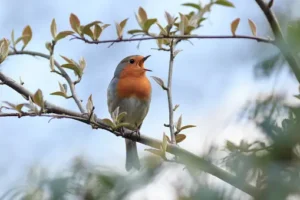
The dawn chorus is a natural symphony that unfolds in the early morning hours, as various bird species engage in a collective and harmonious vocal display. This enchanting phenomenon occurs as birds awaken and communicate through intricate songs, calls, and melodies. Each species contributes its unique vocalizations, creating a rich tapestry of sound that fills the air.
As the sun rises and the world awakens, the dawn chorus serves essential purposes for birds. It establishes territorial boundaries, advertises health and vitality, attracts potential mates, and coordinates group activities. The relatively quiet and still air of the morning allows these avian melodies to travel far, ensuring effective communication over long distances.
The dawn chorus is a testament to nature’s beauty and complexity, offering a glimpse into the interconnected web of life. It evokes a sense of tranquility, wonder, and connection with the natural world, making it a cherished experience for bird enthusiasts, nature lovers, and those who appreciate the serene magic of early mornings.
Do You Know About: What Does It Mean When You See A Cardinal? 5 Important Points
Dawn Chorus Day
Dawn Chorus Day is a celebration of the vibrant early morning symphony created by birds. Observed on various dates globally, it encourages people to wake early and experience the enchanting cacophony of bird songs. The event raises awareness about the importance of birds‘ vocalizations, their role in ecosystems, and the need for their conservation. Participants gather in natural settings, parks, or gardens to listen to the diverse melodies and learn about the species contributing to the chorus. Dawn Chorus Day fosters a deeper connection to nature, inspiring individuals to appreciate the beauty of avian music and work towards protecting these winged wonders and their habitats.
What Time Do Birds Usually Sing Their Dawn Choruses?
Birds typically start singing their dawn choruses in the early hours, about an hour before sunrise. This time varies depending on the geographical location, time of year, and local environmental conditions. In general, the first signs of the dawn chorus can be heard during the twilight period known as the “nautical dawn,” when the sky begins to lighten but before the sun has fully risen.
During this time, the air is often cooler, quieter, and less windy, providing optimal conditions for sound transmission. This allows bird calls to carry farther and be more easily heard by potential mates or rivals. The dawn chorus is an essential part of birds’ daily routines, serving various functions such as establishing territories, attracting mates, and coordinating group activities.
What Do Birds Sing The Dawn Chorus For?
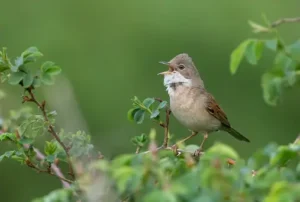
Birds sing the dawn chorus for a variety of crucial reasons, each serving important functions in their lives and ecosystems. These early morning vocalizations play a significant role in their survival and reproductive success:
- Territorial Establishment: One primary purpose of the dawn chorus is to establish and defend territories. Birds sing to mark their presence and boundaries, deterring rival individuals from encroaching on their space. Clear and powerful songs signal strength and readiness to defend their territory.
- Mate Attraction: Many birds sing during the dawn chorus to attract potential mates. The quality of a bird’s song can indicate its health, vitality, and genetic fitness. By showcasing their vocal prowess, birds increase their chances of finding a suitable partner to mate with.
- Communication: The dawn chorus serves as a communication network among birds. Vocalizations convey information about a bird’s location, status, and intentions. This helps coordinate activities within a group, such as foraging or moving to feeding grounds.
- Establishing Hierarchy: Within social bird species, the dawn chorus helps establish and maintain social hierarchies. Dominant individuals often sing more prominently, reinforcing their status and suppressing vocalizations from subordinates.
- Warning Signals: Birds use the dawn chorus to communicate the presence of predators. Alarm calls within the chorus alert other birds to potential dangers, allowing them to take cover or fly away from threats.
- Species Identification: The diversity of bird songs in the dawn chorus aids in species identification. By hearing the distinctive calls of various species, birds can determine the composition of the local avian community and identify potential competitors or allies.
- Environmental Conditions: Birds adjust their vocalizations based on environmental conditions, such as weather and light levels. The dawn chorus helps birds assess the current state of their environment and make decisions about activities like foraging and nesting.
In essence, the dawn chorus is a multifaceted phenomenon that enables birds to establish territories, find mates, coordinate group behavior, communicate vital information, and adapt to their surroundings. It plays a pivotal role in shaping bird behavior, interactions, and the overall dynamics of their ecosystems.
Do You Want To Know: 4 Outstanding Facts Of The Western Meadowlark
Where to Hear the Dawn Chorus?
You can experience the enchanting dawn chorus in various natural settings, such as forests, woodlands, meadows, wetlands, and parks. These habitats provide ideal conditions for birds to sing their early morning melodies. Simply waking up an hour before sunrise and finding a quiet spot in nature will allow you to immerse yourself in the magical symphony of bird songs during the dawn chorus.
How to Deal with Too Much Bird Noise in the Morning
A. Block out the noise with earplugs
While experiencing the dawn chorus, consider using earplugs selectively. These can help block out unwanted human-made noises, allowing you to focus on the soothing melodies of the birds. However, use them judiciously to maintain awareness of your surroundings and ensure safety. Earplugs can enhance your connection to nature, enabling you to fully appreciate the intricate harmonies and calls of the avian chorus while minimizing distractions. Remember to prioritize your comfort and safety while immersing yourself in the tranquil soundscape of the early morning.
B. Make bird-friendly areas in your backyard
Transform your backyard into a haven for birds by creating bird-friendly areas. Incorporate native plants that provide food, shelter, and nesting sites. Choose a variety of trees, shrubs, and flowers to attract different species. Offer a water source like a birdbath or small pond for drinking and bathing. Provide birdhouses and nesting boxes to encourage breeding.
Avoid using harmful pesticides or chemicals that could harm birds and their food sources. Place feeders with appropriate seeds, and consider seasonal offerings. Minimize outdoor cat presence to ensure bird safety. Install perches and branches for resting and singing. By cultivating these elements, you’ll create a welcoming environment where birds can thrive, and you can enjoy the beauty and serenity of their presence right in your own backyard.
C. Play recorded bird calls to distract them
While playing recorded bird calls might seem like a way to engage birds, it’s generally not recommended. Playing recorded calls can have unintended negative effects on both wild birds and their natural behaviors. Birds may become confused or stressed, thinking there are territorial intruders, which could disrupt their feeding, mating, and nesting routines.
Moreover, using recorded calls to attract birds could potentially lead to an over-concentration of bird populations in a specific area, which may strain local resources and create an artificial imbalance. Instead of using recorded calls, focus on creating a bird-friendly habitat by providing natural food sources, water, and suitable nesting sites. This encourages birds to visit naturally and helps maintain a balanced and healthy ecosystem.
Respecting birds’ natural behaviors and habitats is key to supporting their well-being and contributing to the conservation of their populations.
Conclusion
In conclusion, birds are particularly loud in the morning due to a combination of environmental and biological factors that serve their vital needs. The cool, calm air of the early hours enhances sound transmission, enabling their calls to travel further and be heard clearly. This is crucial for communication tasks such as establishing territories, attracting mates, and coordinating group activities. Biologically, hormonal changes triggered by the morning light stimulate birds’ vocalizations, leading to heightened activity during this time. The relative absence of competing sounds allows their messages to stand out, ensuring effective communication.
The morning chorus of bird chirping, while sometimes perceived as simply a delightful natural symphony, is, in fact, a strategic and essential part of their survival and reproductive strategies. By participating in the dawn chorus, birds secure their territories, find mates, share information, and navigate their world. This harmonious cacophony not only enriches the natural world but also offers us a glimpse into the intricate and interconnected tapestry of life that unfolds in the early hours of each day.
FAQs: About Why Are Birds So Loud In The Morning
Why do birds sing more in the morning?
Birds sing more in the morning due to optimal environmental conditions like cool air and reduced noise. These factors enhance sound transmission, allowing their calls to travel farther and be more effective in tasks such as establishing territories and attracting mates.
Do all bird species participate in the morning chorus?
While many bird species join the morning chorus, not all do. Some birds, like nocturnal species, may not contribute as much to the early morning vocalizations. Additionally, some birds may have different peak singing times based on their specific habits and habitats.
What is the purpose of the dawn chorus for birds?
The dawn chorus serves multiple purposes for birds, including territorial establishment, mate attraction, communication within groups, warning of predators, and species identification. It helps birds coordinate their activities, maintain social hierarchies, and adapt to environmental conditions.
Why is the morning chorus louder than other times of the day?
The morning chorus is louder due to the combination of favorable atmospheric conditions and increased bird activity during the early hours. The cooler and denser air of the morning enhances sound propagation, and hormonal changes triggered by sunrise stimulate birds’ vocalizations, resulting in heightened vocal activity.
Can playing recorded bird calls attract more birds to my area?
While playing recorded bird calls might attract some birds, it’s important to use caution. Overuse or inappropriate calls can lead to confusion, stress, and potential disruptions to natural behaviors. Creating a bird-friendly habitat with native plants, water sources, and suitable nesting sites is a more effective and sustainable way to attract and support local bird populations.
Must Visit: Vetpomedix.com
